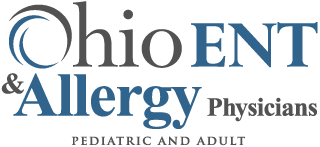Provided by Evan Tobin, MD
and Roger Friedman, MD
If your child has tried antihistamines and/or nasal steroids but their symptoms did not improve, the pediatrician may send a referral to a specialist.
Which specialist? An Allergist or an ENT (Ear, Nose and Throat)?
At Ohio ENT & Allergy Physicians, both specialties work together to sort these problems out. At one of our 10 convenient locations, a pediatric patient with chronic nasal and sinus symptoms can be evaluated for both adenoid problems and allergies. Testing will include routine allergy testing, a thorough physical exam and sometimes the use of a small flexible endoscope to evaluate the nasal passages and check the size of the adenoids. This scope also allows diagnosis of other problems such as a nasal foreign body, a polyp, or a deviated nasal septum (which is rare in children).
Medical treatment may be tried again by our specialists. This may include stronger nasal sprays, antihistamines, antibiotics or allergy shots (immunotherapy).
If this treatment is still not effective, surgical treatment may be offered. This may include removal of the adenoids and treatment of the nasal swellings called “turbinates”. Sometimes tonsillectomy or ear tube insertion may be necessary, as well. (These will be discussed in a future blog.)
These surgeries would likely be done at The Ohio Surgery Center, an accredited, outpatient surgery center staffed by anesthesiologists and nurses with extensive pediatric experience and training. The recovery is usually quite fast with minimal discomfort.
Though up to 90% of children will be effectively treated by addressing allergies and adenoid problems, a small number will continue to have problems. This is where it is extremely beneficial to have the two specialists working together. The allergist will look for more unusual allergies including food allergies or asthma and check the patient’s immune system to make sure it is working properly. The ENT doctors will look for nasal problems such as polyps or chronic sinus infections, utilizing a very low radiation office CAT scanner, when necessary. Having the CAT scan done in the office allows for a convenient “less scary” seated CAT scan (similar to a dental X-RAY). An office scan is also much less expensive than a hospital scan.
A child with a cold is not a pleasant experience. But a cold that never goes away is a sign of a medical problem that requires further evaluation. Once the cause has been determined effective treatment can be offered. This may require allergy treatment, treatment for enlarged adenoids or both.
At Ohio ENT & Allergy Physicians, we have specialists to deal with both allergy problems and adenoid problems in a convenient outpatient setting and in a cost-effective manner.
